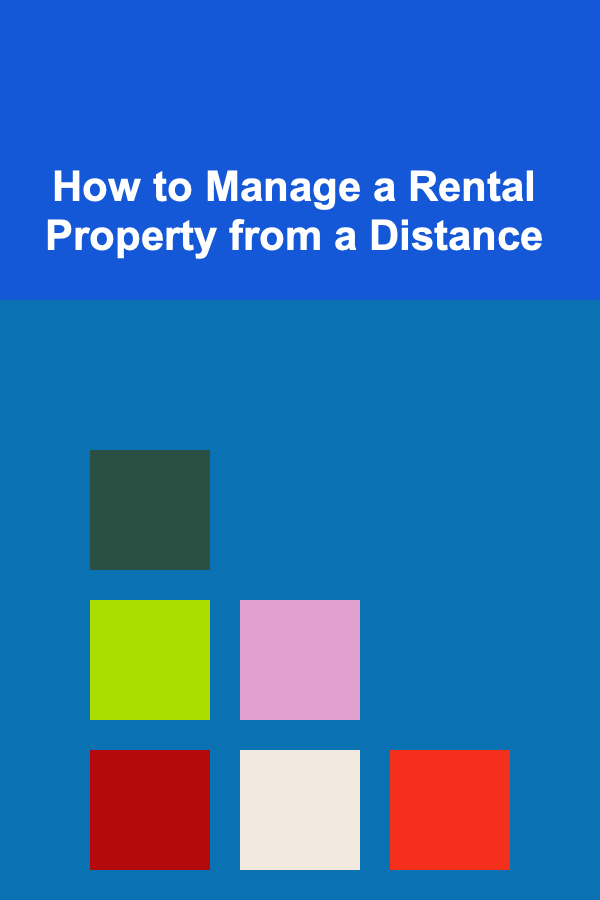
How to Manage a Rental Property from a Distance
ebook include PDF & Audio bundle (Micro Guide)
$12.99$6.99
Limited Time Offer! Order within the next:

Managing rental properties is often a full-time job, but it can be even more challenging if you're doing it from a distance. Whether you live in a different city, state, or even country, managing a rental property remotely is possible with the right tools, strategies, and systems in place. In this guide, we will explore the best practices for managing a rental property from afar. We will cover topics ranging from technology to legal considerations, and from tenant management to maintenance.
Setting Up a Solid Foundation
Before diving into the day-to-day tasks of remote property management, it's important to lay the groundwork. A solid foundation includes having clear goals, understanding your responsibilities, and having a strategy in place to ensure that the property runs smoothly.
A. Clarify Your Property Management Goals
Managing a rental property from a distance can be overwhelming if you don't have a clear vision. Start by setting specific goals for your property. Are you aiming to maximize rental income? Is your focus on long-term property appreciation? Do you want to provide the best possible living conditions for your tenants? Clarifying these goals will help you make better decisions about how to manage the property.
B. Know Your Legal Obligations
As a landlord, you are legally responsible for maintaining a safe and habitable living environment for your tenants. Familiarize yourself with the rental laws in the area where your property is located. This includes understanding tenant rights, eviction laws, and other regulations related to property management. Even if you manage the property from a distance, you must comply with these laws to avoid potential legal issues.
C. Select a Property Manager or Team (if Needed)
While it is possible to manage a property remotely, many landlords choose to hire a local property management company, especially when they live far away. A property manager can handle day-to-day operations like responding to tenant requests, arranging repairs, and collecting rent. If you decide to go this route, make sure to select a reputable company with good reviews, and discuss the specific terms and expectations beforehand.
Embrace Technology to Streamline Operations
One of the key factors in successfully managing a rental property remotely is leveraging technology. There are numerous tools and platforms available that can help automate and streamline the management process. By incorporating technology into your rental property management, you can monitor operations, communicate with tenants, and keep track of finances more effectively.
A. Use Property Management Software
Property management software is an essential tool for remote landlords. These platforms provide a centralized location for managing everything related to your rental property. Some of the most popular property management software includes:
- Buildium: A comprehensive platform that allows you to manage multiple properties, track payments, schedule maintenance requests, and communicate with tenants.
- Appfolio: Another powerful platform that simplifies tasks such as rent collection, lease management, and accounting. It also offers a mobile app for on-the-go property management.
- TenantCloud: A more affordable option for smaller landlords, TenantCloud offers features like online rent payment, maintenance requests, and financial reporting.
These tools will allow you to stay on top of your property's financials, address maintenance needs, and communicate with tenants all from a remote location.
B. Set Up Online Rent Collection
Gone are the days of waiting for paper checks to arrive in the mail. One of the most important aspects of managing a rental property remotely is having an efficient rent collection system in place. Online rent collection systems such as:
- Venmo: A popular app for easy transfers.
- PayPal: A trusted service for secure rent payments.
- Zelle: A free, instant payment system offered by many banks.
- Rentec Direct: A dedicated service for landlords to accept online payments and manage tenant accounts.
These systems allow tenants to pay their rent electronically, making it easier for you to collect payments and for tenants to stay current. With automated reminders and late fee notifications, you can minimize the risk of missed payments and late fees.
C. Implement Maintenance Request Platforms
Handling maintenance requests remotely can be tricky, but with the right platforms, it's entirely manageable. Most property management software, like Buildium and Appfolio, includes a built-in system for tenants to submit maintenance requests. You can use these platforms to review the requests, prioritize issues, and send them to the appropriate contractor.
Alternatively, independent platforms like Fixflo or TenantCloud can also be used. These systems allow tenants to report issues, upload photos, and provide details of the problem. They can also generate work orders for contractors, making it easier to resolve issues without being physically present.
D. Use Smart Home Devices
Smart home technology can provide a significant advantage in managing a rental property from a distance. Devices like smart locks , smart thermostats , and security cameras can give you remote access to your property, allowing you to monitor it without being physically present. For example:
- Smart locks: Allow tenants to enter the property without needing to provide keys. You can control access remotely and give temporary access codes to maintenance workers or contractors.
- Smart thermostats: Help you ensure that the property is energy-efficient and prevent issues like frozen pipes in winter. You can adjust the temperature remotely based on weather conditions.
- Security cameras: Monitor the property remotely for potential issues or security concerns. These devices can also help deter criminal activity.
These tools not only improve efficiency but also give you peace of mind knowing you can monitor the property from anywhere in the world.
Screening and Managing Tenants from Afar
Tenant management is a critical aspect of running a successful rental property, and doing it remotely requires careful planning and organization. The process of screening tenants, collecting deposits, and managing tenant relationships all need to be streamlined to ensure success.
A. Conduct Thorough Tenant Screening
Tenant screening is one of the most important steps in ensuring the long-term success of your rental property. If you manage properties remotely, you may not be able to meet tenants face-to-face. Fortunately, technology can help you screen tenants thoroughly without being physically present. You can use services like:
- TransUnion SmartMove: An online tenant screening service that allows landlords to check credit scores, criminal history, and eviction records.
- RentPrep: A service that offers background checks, credit reports, and rental history verification.
Using these services, you can ensure that the tenants you select are reliable and financially stable, reducing the risk of late payments, property damage, or eviction.
B. Sign Leases Electronically
Gone are the days of printing and mailing physical lease agreements. Electronic signatures are now legally binding in most jurisdictions. Services like DocuSign or HelloSign allow tenants to sign lease agreements online, which saves both time and effort. This is especially helpful when you're managing multiple properties in different locations.
Ensure that your lease agreements are clear and comprehensive. They should outline rent payment schedules, maintenance responsibilities, and the rules for terminating the lease. You can also automate the lease renewal process by setting reminders for when the lease is nearing its end.
C. Stay in Regular Contact with Tenants
Communication is key to keeping your tenants satisfied and your rental property running smoothly. Even if you're managing the property from a distance, it's important to stay in regular contact with your tenants. Regular check-ins allow you to address concerns promptly, collect feedback, and ensure that everything is running as expected.
Some ways to maintain communication with tenants include:
- Email: Use email to send rent reminders, maintenance updates, and general announcements.
- Text messages : For more immediate communication, consider texting tenants for quick responses. Services like EZ Texting or Twilio can help you manage text communications at scale.
- Video calls: If you need to have more in-depth conversations with tenants, schedule a video call using platforms like Zoom or Skype.
By maintaining open lines of communication, you'll create a positive relationship with your tenants, leading to longer tenancies and fewer issues.
Handling Maintenance and Repairs
One of the most challenging aspects of managing a rental property from a distance is dealing with maintenance and repairs. Fortunately, with the right systems in place, you can handle repairs efficiently and effectively without being there in person.
A. Build a Network of Reliable Contractors
A key part of managing rental property from afar is having a reliable network of contractors, maintenance workers, and service providers. Whether it's an electrician, plumber, landscaper, or general handyman, you'll need a trusted team of professionals who can handle repairs promptly and to a high standard.
Start by researching local contractors or asking your property manager (if you have one) for recommendations. Once you have a list of reliable contractors, establish clear terms with them regarding pricing, availability, and the types of services they offer. It's also a good idea to build relationships with multiple contractors so that you have backup options in case of an emergency.
B. Establish Maintenance Procedures
It's essential to have clear procedures for handling maintenance requests. Ensure that your tenants know how to report issues and that they have clear instructions on what to do in case of an emergency (e.g., water leaks or power outages). Use online platforms to track requests and ensure that all issues are handled in a timely manner.
You should also establish a system for emergency repairs. For example, if a tenant calls with a plumbing emergency, make sure you have an emergency plumber you can contact immediately to resolve the problem. Consider setting aside a maintenance fund to cover unexpected expenses.
C. Conduct Remote Property Inspections
While you won't be physically present to inspect the property, it's important to regularly assess the condition of your rental. Depending on your situation, you can either hire a local property manager to conduct inspections or ask your tenants to take photos and videos of the property. These inspections should be done at least annually or whenever a tenant moves in or out.
You can also use virtual property inspections where you schedule a video call with your tenants to walk through the property. This allows you to see the condition of the property and ensure that everything is in good shape.
Financial Management and Reporting
Effective financial management is crucial when managing rental properties from a distance. This involves tracking rent payments, paying bills, and keeping accurate financial records.
A. Use Accounting Software
To manage the financial aspects of your property remotely, use accounting software like QuickBooks or Xero. These platforms allow you to track income, expenses, and create financial reports. Many property management software platforms also include built-in accounting features that help you keep track of rent payments and expenses in one place.
B. Set Up Automated Payment Systems
Set up automated payment systems for rent collection, property taxes, and maintenance costs. Most property management software includes options to automate rent payments. This helps you avoid late fees and ensures that you don't miss any payments.
C. Hire a Remote Accountant or Bookkeeper
If you're managing multiple properties or want to ensure accurate financial records, consider hiring a remote accountant or bookkeeper. They can help you prepare tax returns, track your income and expenses, and ensure that you're compliant with local tax laws.
Conclusion
Managing a rental property from a distance can seem like a daunting task, but with the right strategies and tools, it is entirely possible. By leveraging technology, hiring trusted professionals, and maintaining good communication with your tenants, you can successfully manage your property from anywhere in the world. Whether you are looking to maximize your investment, provide a safe and comfortable home for your tenants, or simply streamline your operations, this approach will help you achieve your goals.

How to Animate Objects in Augmented Reality
Read More
How to Choose the Best Time of Year to Move
Read More
How to Invest in Gold and Precious Metals
Read More
How to Use Spreadsheets to Track Important Information
Read More
How to Use String Lights to Enhance Your Holiday Home Decor
Read More
Why Using Baskets Can Enhance Your Home's Aesthetic
Read MoreOther Products

How to Animate Objects in Augmented Reality
Read More
How to Choose the Best Time of Year to Move
Read More
How to Invest in Gold and Precious Metals
Read More
How to Use Spreadsheets to Track Important Information
Read More
How to Use String Lights to Enhance Your Holiday Home Decor
Read More